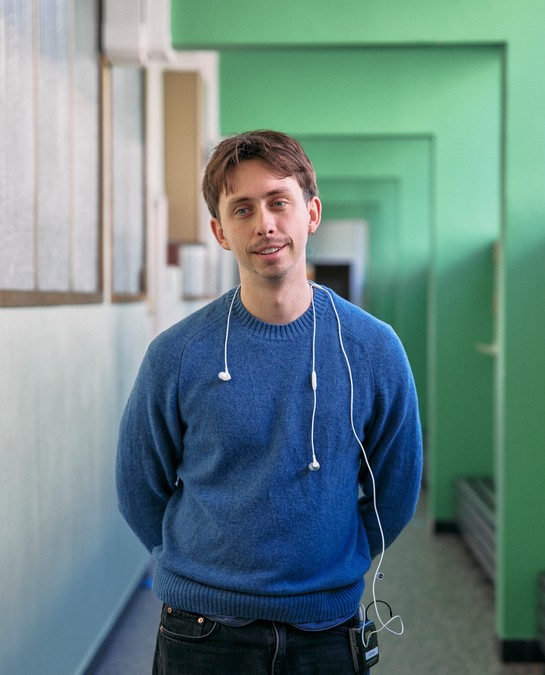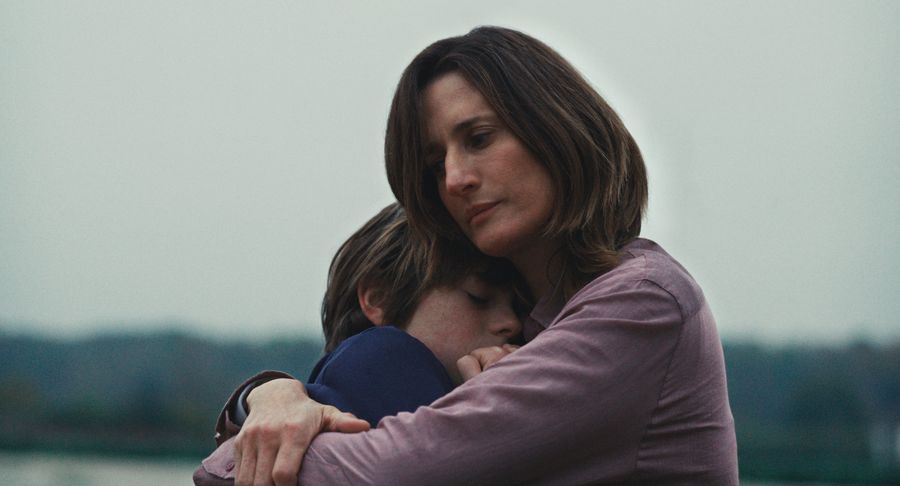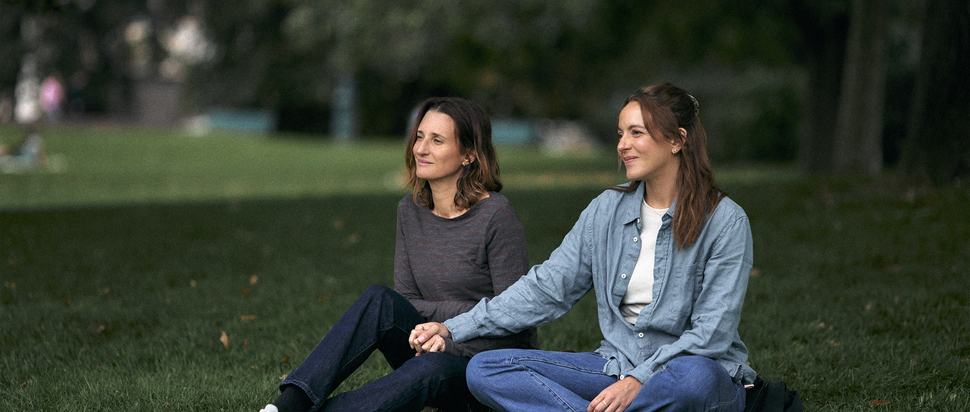KVIFF 2025: Nathan Ambrosioni on Out of Love
We meet the talented young French filmmaker Nathan Ambrosioni, who sold his game consoles at 14 to buy his first camera. Now 25, he's just won the Crystal Globe for Best Director at the Karlovy Vary International Film Festival
It’s been a few weeks since my visit to the Karlovy Vary International Film Festival and I’m still thinking about Out of Love. That intimate French drama from talented young writer-director Nathan Ambrosioni was the best thing I saw in this year’s Crystal Globe Competition, the festival’s most prestigious prize. The competition’s jury clearly agrees on Ambrosioni’s talent: they awarded him the Crystal Globe for Best Director, a prize which he shared with Lithuanian filmmaker Vytautas Katkus (The Visitor).
Ambrosioni is only 25, but Out of Love is his third professional feature, following 2018’s Paper Flags and 2023’s Toni... or it’s his fifth if you include 2014’s Hostile and 2016’s Therapy, two self-produced horrors he made with friends as a teenager. His latest work is a sensitive, intimate drama that begins with Suzanne (Juliette Armanet), a young widow who disappearing one night with no explanation, leaving her two children with her older sister, Jeanne (Camille Cottin). Rather than focus on the mystery of why Suzanne walked out of her life, Ambrosioni’s deeply humane film is more concerned with how the children and Jeanne adjust to the profound changes to their world caused by Suzanne’s absence.
The day after Out of Love’s world premiere, I met up with Ambrosioni at Hotel Thermal, a gorgeous and imposing brutalist concrete building in Karlovy Vary’s old town that serves as the festival’s main hub. We discuss his early start in filmmaking, his cinematic influences and how, with Out of Love, he wanted to make a piece of non-judgmental cinema.
The Skinny: I know you started making films very early. You made your first feature film, Hostile, when you were 14, is that right?
Oh, it was very much an amateur film.
Yes, but even still, making a feature at 14 is an impressive feat. How did you get started?
I watched a film called Esther. I don’t know if you know that movie. It's about an orphan who goes on a killing spree. It's quite an amazing but disturbing movie.
I think that film might just be called Orphan in English. It’s about a psychopathic young girl who turns out to be a much older woman, right?
Yes, that’s the one, I think. So Orphan, I watched it when I was 12, and it changed my perception of movies totally, because it was the first time I was feeling so scared; I was feeling that much emotion as a young adult. I loved it so much that I wanted to feel that all again, but I wanted to do it myself. So I started watching tutorials on how you make a film, about how you edit a movie. And I started making films with my friends.
We didn't have any budget, but I think coming from the countryside in the south of France helped me a lot, because I was not, like, from a family of Parisian cinephiles or anything. I didn't feel judged in any way, like my parents didn't care at all. To them, I was just going to the woods with my friends and playing, but I was making all sorts of movies. So that helped me to get confident and to love filmmaking. And it was all I did, honestly. I kept on making movies all throughout my teenage years. Every night I’d be editing my films or writing a scene for the next day.
Were you just shooting on your phone, or did you get hold of a camera?
I sold all my toys, like my DS and my Wii – everything. I sold it all to help my parents buy me a camera for Christmas, because I wanted one that could film in the dark with infrared vision, and it was expensive. So, yeah, I sold everything, and I had this camera, and I used my dad's computer to edit the film. It was a found footage movie, because I knew I had nothing and so had to make it cheap, and I thought about the Blair Witch Project – they made that for like 1000 euros. I didn't have 1000 euros, but I had a camera and some friends.

Nathan Ambrosioni | Photo by Manuel Moutier
You’ve moved away from the horror genre with your professional films Paper Flags, Toni and now Out of Love, which are all family dramas, and the two most recent are specifically interested in motherhood. What attracts you to that subject?
When I was a teenager, I was only really watching horror movies. So I think you’re the product of what you watch in a way; you are what you eat. I was only watching horror films, so I was only making horror films. But then I discovered another kind of cinema through French and international auteurs. And then I cried for the first time at a movie, and it was as if a new emotion was unlocked. I wanted to understand where that came from, and it became pretty obvious that I wanted to make dramas, because I don't know, it's just such a pure emotion to make people cry or to make people feel empathy.
What was that film that made you cry?
The first film was Mommy by Xavier Dolan. I was with my mom and it was actually Mother's Day, so we went to this film called Mommy. My mom was traumatised, but not in a bad way. And I just cried a lot, and I was like, 'Oh, that's so cool'.
And tell me about Out of Love. What inspired that story?
For me, this is a personal film. Nobody ever disappeared in my family, but my family was, like, quite dysfunctional when I was a teenager, and my mom had some issues. I wanted to talk about that, and also about how fascinating it is to choose to disappear. It's such a mystery. So I thought of it as doing a ghost story, in a way. It's about somebody who left and is never going to come back, but she’ll continue to haunt these people’s lives.
Going back to Xavier Dolan, I guess, superficially, you’re both quite similar, in that you both started making films very young, but in other respects, your films are very different. You seem to be a much less bombastic director, you seem much more interested in subtle, quiet moments.
I think subtlety is everything in movies, that’s what I'm really drawn to. I mean, I love Xavier Dolan. I admire him so much and he helped me to feel confident to make movies too, because he made his first film when he was 18, and I was 16, and I was like, ‘Maybe I can make one too!’ So his films helped me a lot, and I still love his cinema, but my taste went towards other filmmakers. I discovered people like [Hirokazu] Kore-eda, and I discovered Edward Yang, who’s one of my favourite directors. I don't know if you've seen Yi Yi or Brighter Summer Day or Taipei Story. Those are such great movies, and they’re all about subtlety.
Kenneth Lonergan's Manchester by the Sea was also such a big reference for me, particularly for Out of Love. It's about real people, and it feels real in a way that makes you even feel uncomfortable sometimes. But I have to practice, I think. I'm still really far from Kore-eda or Lonergan.
Maybe this would be a good point to ask about Camille Cottin’s performance, which is quite different from how we’ve seen her in other films and shows.
Camille is so great, but you’re right, she's a really demonstrative actress in the best way possible. But I wanted to take her and to put her in another position. I was like, ‘I don't want you to talk that much, I don't want you to lose yourself, I want you to be contained.’ And I think it was hard for her in a way, because actors want to show off, and that's normal, that's not a criticism. We're so used to actors getting Oscars because they are doing extreme things. But that's what I love about Kore-eda's movies; I'm fascinated by how natural they are in a way that's super-realistic, because honestly, in everyday life, I don't see people scream that much. I mean, it happens, but when you're dealing with stuff in everyday life, you often just have to get on with it. But yeah, sometimes Camille was like, 'Can I scream and can I cry in this scene?' And I was like, 'We can do a take if you want, but I'm not gonna choose this take.'
I read that Camille initially had some reservations about the character. She was worried that Jeanne was a bit too spiky, is that right?
Yes, she was surprised when she read the script, because we did a movie together before this one called Toni, and that character was super nice, and she's overwhelmed with love for her kids; she feels a lot. But when Camille read this one, she was like, 'Wow, she is really cold', but I think Camille understood her so much because she was like, 'Of course she's cold. She lost the love of her life, and now her sister has disappeared, and she has to deal with kids that she doesn't want.' I wanted her to start as cold because I wanted to unfold her character subtly.
The film is about a static woman who has to put herself in motion. If she started as joyful, I don't see the film ever evolving. Plus, so often women characters are written to be emotional and super devoted to their kids and other people in films. And I think it's important just to show how some women aren’t drawn to motherhood, and that's okay. It doesn't make you a bad person.

I also want to emphasise to readers how funny the film is. You find so much humour in this heartbreaking situation.
It’s so nice that you say that, because some people don't seem to think it's that funny, but I wanted it to make people laugh at points because of course it's a depressing and horrible situation, but it's also an absurd situation for them. [Jeanne] is stuck with those kids and she doesn’t know how to interact with them. For the kids, they’re there with their aunt who doesn't want them. So it’s tragic, so we have to take a bit of distance from it. That's why I wanted the camera to be in wide shot most of the time because I didn't want it to be too intense. I wanted the story to be intense, but I wanted the camera to be neutral, like we are observing them. But we don't judge the characters; we don’t intrude.
I think that's what I liked so much about the film, how non-judgmental it was. It’s not a film looking to point fingers at anyone.
That was really important for me. Of course, sometimes you need a point of view, and you need to say something about society or about a crisis. We need those kinds of movies. But I was interested in this subject because it's just so ambiguous and tricky. We can't judge it because that's the point of people disappearing: we don't know why they're doing it. So if you don't know the reason, then it’s hard to judge. And also, Suzanne has not done anything wrong in terms of the law. It's not like she just left her children behind. She left them in a safe place with their aunt. So you can't judge her in the eyes of the law, so let's also not judge her in a human way too. Let's try to find humanity in this act, and let's try to find empathy for Jeanne and for Suzanne.
I really hope that when people leave the film, they don't feel angry with Suzanne. I really wanted the audience to live in peace and feel like, 'OK, we are never going to know, and maybe she's never going to come back. But I don't hate her for it.'
Out of Love had its world premiere at Karlovy Vary International Film Festival
